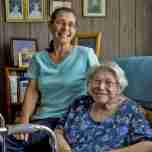Family considerations

For some of us, family is paramount; for others, family is relatively unimportant. It depends very much on our life experience, whether we have siblings, whether we have children and grandchildren, if either of our parents is still alive. Even if we have family, it very much depends on how close or not we are with them; for some of us regular contact is vital, for others it can be fairly take-it-or-leave-it. This means that however much we might be told how important family is to older people, there is no “one approach fits all” as far as family ties and responsibilities are concerned.
Extensive research has been done on the importance of family in a senior’s life, and there is no doubt that for many older people family provides a consistent social network and has a direct positive impact on their overall quality of life. Seniors who maintain strong ties with their family have been shown to outlive those who don’t, are less prone to depression and feelings of loneliness, and retain memory and other cognitive skills better. Having said that, for many older people who do not have family to connect with a close network of friends can provide the same sort of support.
Family dynamics shift throughout our lives, and one of the biggest changes is that between parents and their children. Parents take care of their children when they are young, and there is a general assumption that when we need caring for as seniors they will take some responsibility for looking after us. That’s the theory, but we can’t take anything for granted in these changing times.
Maybe the most important thing we can do as seniors is make a commitment to communicating honestly with our remaining family members, clarifying practical issues like wills and healthcare arrangements, getting a sense of how much we can reasonably expect from them and they from us. We won’t be here for ever, and if we are fortunate enough still to have a family, now is the time to make the most of whatever we share with them.





